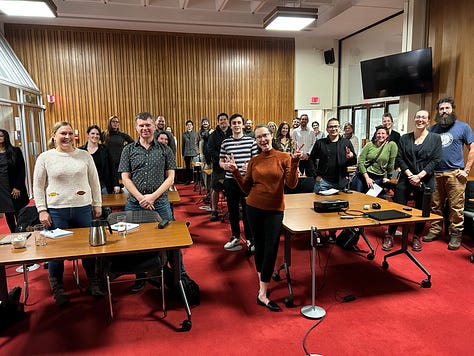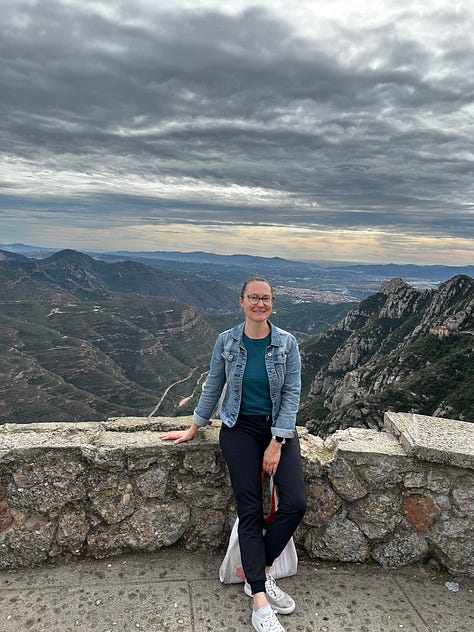Why are New Year resolutions fraught? They are often unrealistic and short-lived. They often don't take into account the fact that changing behaviour takes time and effort. And they can be a source of guilt and shame when they don't live up to expectations.
I propose a different approach.
Set yourself up for a transformation instead of setting lofty goals that will be prioritized after a few weeks or months. If you're anything like me, with the year drawing to a close, I find it easy to get caught up in holiday festivities and year-end obligations and feel tempted to make excuses for not having time to sit down and reflect.
Even amid the chaos, reflecting on the year is empowering and transformative.
For the last five years, I've set aside time in the final few weeks before January to reflect on the year. This has given me the opportunity to process my successes from the year, the challenges I experienced, and the milestones I achieved. Nothing crazy, just an hour or two.
I also take time to identify areas where I can improve and create an action plan for the coming year. This has helped me gain clarity and focus and has been great for beginning the new year with a fresh perspective.
This personal retreat is far better than any New Year resolutions I made in the past.
In this article, I want to introduce my personal framework for reflection and goal setting, which has helped me personally and professionally in so many ways.
My hope is that you will also find this inspiring and will contribute to making your life more meaningful and fulfilling. Taking time to reflect on the year and set goals for the upcoming year can help you stay organized and on track.
It can also help you focus on the most impactful things and prioritize your time accordingly.
"I've never seen any life transformation that didn't begin with the person in question finally getting tired of their own bullshit." ~ Elizabeth Gilbert



I love this quote from Elizabeth Gilbert because it wasn’t until I hit my personal “rock bottom” after my first solo trip to Costa Rica in 2015/16 that I began to take real steps towards healing myself and building the life I want.
Step One: Reflect on the Past
Take a thoughtful journey through the highlights and challenges of the year. What valuable lessons did you glean? Define the overarching theme that encapsulates the essence of the past year.
Did any surprises reshape your path? Identify the standout moments that left a lasting impression. Consider the transformative impact of these events on your personal growth. What memories will endure half a decade from now?
Allocate 30 minutes to explore various facets:
Review social media interactions
Look over your camera roll on your phone
Revisit pivotal emails
Examine your calendar for significant events
Peruse your journal for deeper insights
Reflecting on the past, my previous years were marked by distinctive themes:
2017, the "Year of Renewal"
2018, the "Year of Relationships"
2019, the "Year of Growth"
2020, the "Year of Alignment"
2021, the "Year of Activation"
Interestingly, 2022 remained unnamed as I experimented with deprioritizing this reflective exercise. It turned out to be a valuable test, proving how important this annual ritual is for personal development. Consequently, I recommit to this practice for 2023, with the theme yet to be revealed - I am looking forward to my own personal retreat later this month!
Step Two: Conducting a Life Audit
The next step is to evaluate your level of fulfillment across various facets of your life by rating each category on a scale of 1-10 (or 1-10).
Taking an introspective look at your life helps you figure out what needs improvement. As soon as you've identified areas that need improvement, create an action plan to address them, which we'll talk about in the next steps.
Categories for Evaluation:
Health + Fitness
Friends + Community
Love + Relationships
Family
Creativity + Adventure
Career
Money & Finances
Emotional Well-Being
Step Three: Looking Ahead
There are a few exercises to complete in this step.
First is the the Short List:
What are the 3–5 things that, if you achieved them, would make next year a huge win? What really matters?
Then you want to move on to the Big List:
Make a list of everything you want to accomplish, contribute, and become next year. Both professional and personal goals should be included. Make sure they're achievable and realistic.
Examples:
I establish a consistent yoga, strength + conditioning practice
I am confident, vibrant and full of joy ❤
I have an abundance mindset and I generate an income that supports my travel and savings goals.
Ask yourself, what is the motivation behind your intentions? What's your Why? How would your life be better if you achieved them? On a scale of 1 to 10, how comfortable do your intentions make you feel?
Step Four: Making a Plan
Once you have this list, break it down into small steps and start taking action to achieve your goals. Break down each step into smaller, achievable tasks. Focus on completing one step at a time, and don't get overwhelmed. Monitor your progress and adjust your plan accordingly as you go along. And make sure you bake some fun into your goals and action plan. The number one reason people give up on good habits is because they are not enjoyable.
Ask yourself the following questions:
How will you know you're on track?
Which new habits, practices, or mindsets do you need to adopt?
What kind of relationships do you need to build? Who can you turn to for help?
Are there any habits, practices, or mindsets you need to let go of?
How can you make these practices FUN?
"We are not imprisoned by our circumstances. We are not imprisoned by the luck we get or the inherent unfairness of life. We are not imprisoned by crushing setbacks, self-inflicted mistakes or our past success. We are not imprisoned by the times in which we live, by the number of hours in a day or even the number of hours we’re granted in our very short lives. In the end, we can only control a tiny sliver of what happens to us. But even so, we are free to choose, free to become great by choice."
~ Jim Collins
Looking back on the last eight years of my life and conducting an annual life audit, I am so grateful for the growth and the people who have supported me in my journey to living a more values-aligned life.






Ultimately, reflecting on the year can be a powerful tool for self-improvement and growth. Wishing you all the best for 2024 and beyond! Take time to reflect on your lessons and how to apply them in the future. Evaluate the successes and accomplishments of the year and use them to motivate yourself to keep going. Finally, create goals and an action plan for the upcoming year.



